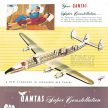The International Air Transport Association (IATA) has announced that both international and domestic travel demand showed significant momentum in July 2021 compared to June, but demand remained far below pre-pandemic levels.
According to IATA extensive government-imposed travel restrictions continue to delay recovery in international markets.
Total demand for air travel in July 2021 (measured in revenue passenger kilometers or RPKs) was down 53.1 percent compared to July 2019 but this is a significant improvement from June when demand was 60 percent below June 2019 levels.
Broken down international passenger demand in July was 73.6 percent below July 2019, bettering the 80.9 percent decline recorded in June 2021 versus two years ago.
IATA said that all regions showed improvement and North American airlines posted the smallest decline in international RPKs.
READ: Qatar Airways Privilege Club offers superb deals
Total domestic demand was down 15.6 percent versus pre-crisis levels (July 2019), compared to the 22.1 percent decline recorded in June over June 2019.
Commenting on the numbers Willie Walsh, IATA’s Director General said “July results reflect people’s eagerness to travel during the Northern Hemisphere summer.

“Domestic traffic was back to 85 percent of pre-crisis levels, but international demand has only recovered just over a quarter of 2019 volumes.
“The problem is border control measures. Government decisions are not being driven by data, particularly with respect to the efficacy of vaccines. People traveled where they could, and that was primarily in domestic markets.
“A recovery of international travel needs governments to restore the freedom to travel. At a minimum, vaccinated travelers should not face restrictions. That would go a long way to reconnecting the world and reviving the travel and tourism sectors.”
The exception to the domestic recovery was Australia where domestic traffic sank further from a 51.4 percent decline in June versus the same month in 2019, to a 75.4 percent decline in July versus two years ago, amid stricter domestic lockdowns in response to a spike in the Delta variant.
In stark contrast, US domestic traffic continued to recover in July and was down just 7.7 percent compared to July 2019, improved from a 14.0 percent decline in June versus June 2019.
Mr. Walsh added that “as the Northern Hemisphere summer travel season draws to a close it is clear that too many governments missed the opportunity to apply a risk-based approach to managing their borders.
“The growing number of fully vaccinated travelers and the prevalence of testing provided the chance to restore international connectivity and bring much-needed relief to economies that are heavily reliant on travel and tourism.
“Instead, governments continued to behave as if it was the summer of 2020. Economies and the labor force will pay the price for decisions that were made not based on science, but on political expediency. Governments have rightly urged their populations to be vaccinated; now governments need to have confidence in the benefits of vaccinations—including the freedom to travel.”
























